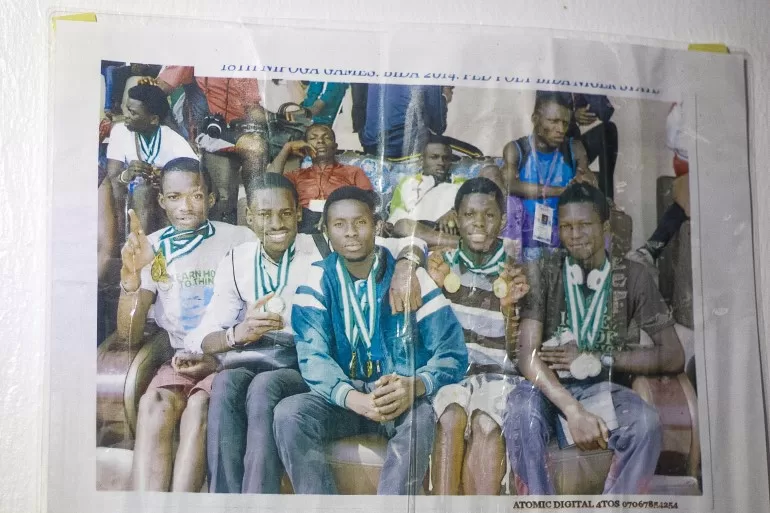Lagos, Nigeria – There was a glint in Tunde Onakoya’s eyes that concealed the chess prodigy’s exhaustion as he made it to the 60-hour mark – breaking the world record for the longest marathon chess game.
Bundled up in a jacket, scarf and hat, the 29-year-old Nigerian squared off against American chess champion Shawn Martinez in New York’s Times Square in April to complete the attempt and raise funds for his Chess in Slums project, which helps children across Africa.
In New York, a crowd of enthusiasts and media flanked Onakoya with camera clicks and cheers, while back home Nigerians, including the president, cheered him on online.
“I celebrate this chess champion for his rare feat, but especially for the reason driving this compelling demonstration of character, which is raising funds for African children to learn and find opportunity through chess,” Nigerian President Bola Tinubu posted on social media as the record was broken.
“My administration remains strongly committed to creating and expanding opportunities for the youth to explore and exercise their abilities,” the president said.
But in small chess clubs and schools in low-income areas of Nigeria’s main city, Lagos, though there is renewed passion for the game due to Onakoya, players say there is little state support.
In Ojodu Berger, a bustling, densely populated district that borders Lagos from Ogun State, Mohammed Azeez sits down on rented chairs and makeshift tables in his parents’ house, teaching children and teenagers how to play chess.
There are at least a dozen children who come around in the evenings and on weekends for extracurricular lessons, all registered under his nonprofit Milverton Chess Academy. He accepts donations from parents but has kept the academy free-to-attend since he started it, informally, in 2004.
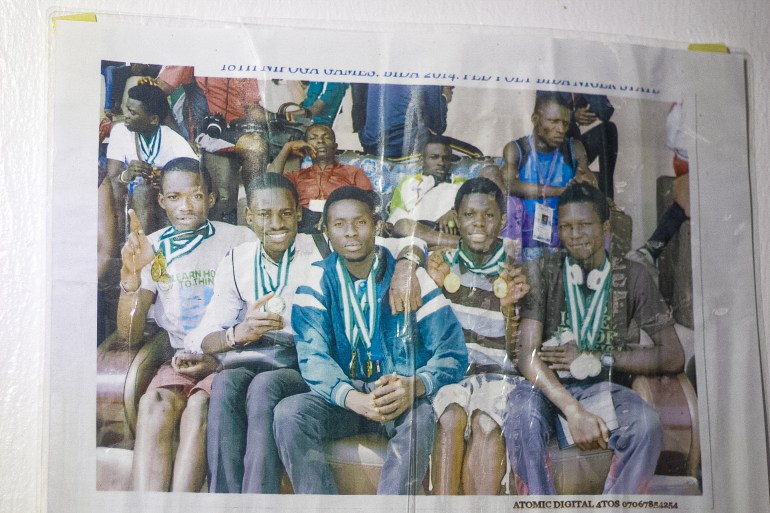
“The first person I taught how to play chess is now in the UK. He was a friend and I taught him. Nobody taught us how to checkmate with a king or a rook. We sat down ourselves and figured it out,” Azeez said.
The 40-year-old started playing chess more than two decades ago when he was enrolled at the University of Ado-Ekiti. “A friend of mine … took me to a chess club in the school and I defeated a lot of good players there. After that day at the university, the chess coaches used to call me to come and read new chess books whenever they got them,” he said.
However, soon after, his brother who was the eldest child, died, so Azeez had to quit school and return to Lagos to find work. But he wanted to do something with his new chess knowledge.
“I find it difficult to have the knowledge of something and not share. That was why I started the academy. I wanted people to benefit from it, because chess teaches a lot.”
Two boards for a dozen players
Despite Azeez’s passion, the stark odds of “having only two boards for dozens of kids to share”, and no space to teach them have slowed his efforts.
“I have been using a small space in my compound to train kids in my community… I have raised so many children to become chess players in my community. Now, I have more kids who want to learn … but I don’t have any more space to teach them.”
Due to the lack of resources and opportunities, Azeez said he has been unable to participate in national tournaments or benefit financially from his chess skill. Yet, it doesn’t discourage him from teaching others.
“While I was reading about chess, I discovered that it is a game that teaches logic, philosophy, psychology and mathematics, and if you play chess your level of reasoning would be higher. Chess can bring lots of good to kids and even adults.”
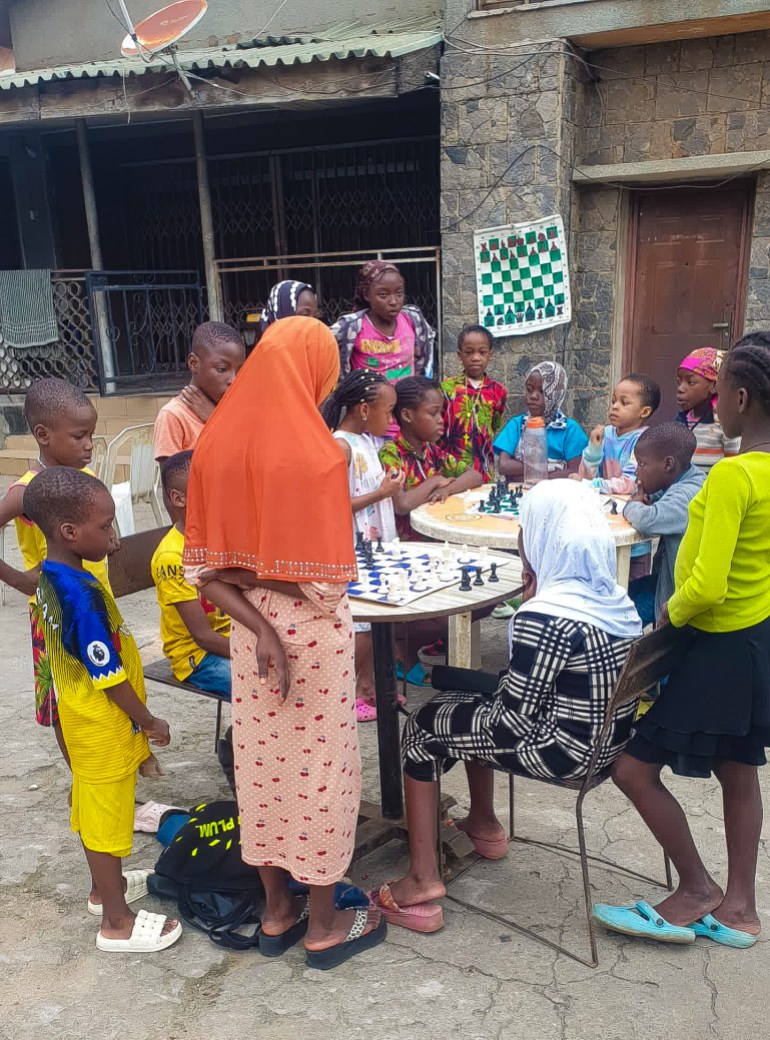
Onakoya’s feat in New York also inspires Azeez to stay on his toes despite the hurdles he faces.
“Truth be told, it gave me courage to never stop [doing] what makes you happy. And that no matter how difficult it is, God would definitely see one through,” he said.
“Tunde really did well and many parents now bring their children to me to learn how to play chess. They said they are inspired and that their friends had told them that chess would be an elite game in the future.”
Many parents who approach Azeez do so because they “think that chess is a game for rich people” and that playing it can help their families financially, he said. But the reality sometimes makes them backtrack.
Talking about a student called Dotun who attended his academy, Azeez said the child “knows how to play chess very well” and “competed against a lot of other good players and won”. But his socioeconomic conditions were dire.
“His parents stayed in a one-bedroom apartment with four children, and they couldn’t even afford to buy a chessboard for him,” Azeez said. “Till now, there’s been no money to help him … [and] I have not seen Dotun again.”
Other players he trained have found ways to help the academy in return. A former student of his called Nonso “supports us with chess boards whenever he has money”, Azeez said – even giving the academy part of his winnings from chess competitions.
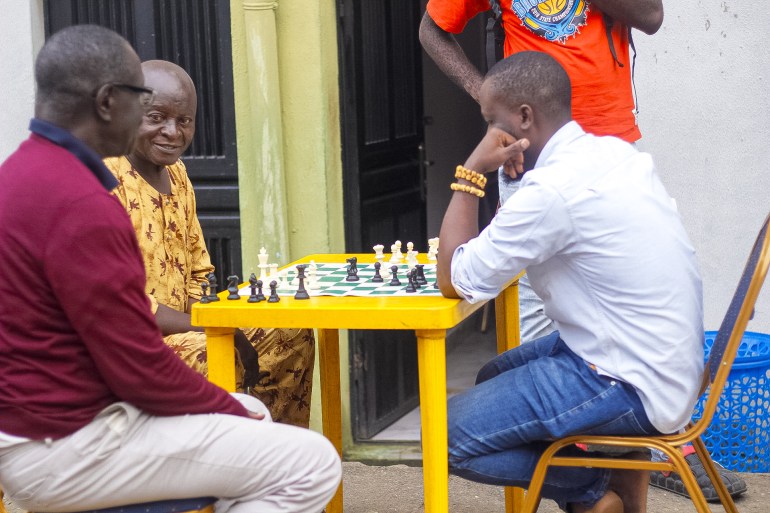
Lack of facilities
Chess champion Onakoya has not only inspired children. “I fell in love with the game after watching Tunde Onakoya complete his 60-hour Guinness World Record attempt,” 28-year-old Ijeoma Uchenna who works at an insurance firm in Lagos, told Al Jazeera.
“I’m not really looking to play it professionally, but I want to learn it to enjoy playing it for leisure,” she said, explaining that she knew nothing about the game before but now pays a private tutor 10,000 naira ($7) per session to learn.
“Even if I couldn’t afford it right now, I would have still looked for someone that knows how to play and I would befriend them [hoping] they would put me through [teach me],” she said.
For the past few years, the Nigerian chess community has called for the introduction of chess into the country’s school curriculum.
While there are nonprofit initiatives and some sponsored by corporates, having chess in state schools in Nigeria is not yet a common feature. In the recent National Schools Team Chess Championship, held in Lagos in May, only 200 schools out of the tens of thousands that exist in the country participated.
For his part, Azeez has tried to take his trainees to the nearby government-run community vocational skills acquisition centre to practise and play, but its empty training rooms “are always locked” and restricted from the public without authorisation, he said.
“There’s hardly anywhere that is conducive to playing chess. We don’t mind renting our own chairs and tables, but we need a space to use,” Azeez added, explaining that to use available public buildings you need permission, which can only be granted by getting a letter from the Federal Ministry of Youth and Sports Development.
“I have written the letter and sent it through some people that can go there. I have not gotten any response yet … It is like they prefer these facilities abandoned than actually in use,” he said.
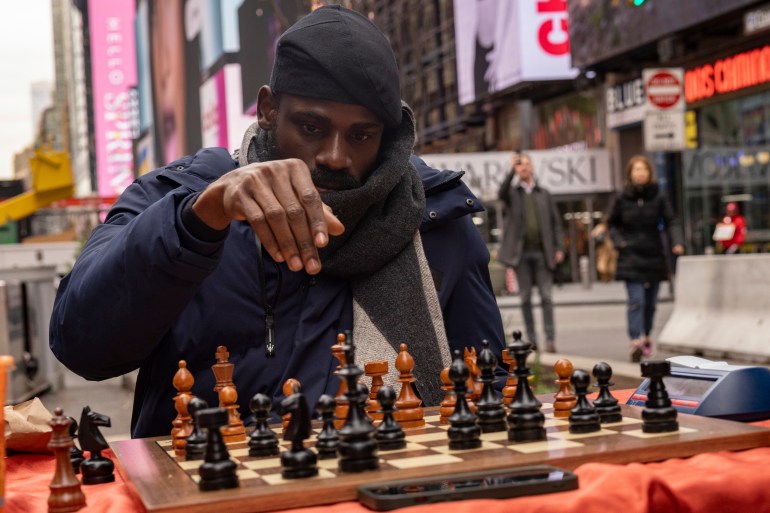
The challenges exist at all levels. Onakoya has also had to set up makeshift training areas under bridges and inside the Makoko floating settlement, among other areas, to keep training children.
Together with volunteers, Onakoya would gather children under Lagos’s Oshodi bridge with dozens of chess boards to teach them the game. Other times, he and his team would take canoes to Makoko – a community of makeshift shack houses stilted on the Lagos Lagoon – as part of their outreaches.
Donations
The Nigerian Chess Federation (NCF), the body currently overseeing chess activities in Nigeria, also cannot really assist people like Azeez or Onakoya, because it too struggles with funding.
The NCF – which was set up by dentist Dr Sylvan Ebigwei and his friends in 1975 – had a shaky start initially, waiting over a decade to be recognised by the Nigerian Sports Commission. Since then, it has had to organise its leadership and fund its activities, which include sponsoring Nigerian chess players abroad for tournaments, all from its own pockets.
Nearly 50 years and dozens of home-grown global champions later, the NCF is mostly funded by donations and sponsorships.
In a recent interview with The Punch newspaper, the NCF president, a former police inspector general, Sani Usman, said the federation has had to ask its zonal representatives to “raise funds and host their championships” as part of efforts to support the growth of the game in the country.
Out of the 31.7 billion naira ($20m) allocated to the Sports Ministry – a stark 0.10 percent of the country’s 28.7 trillion naira ($18bn) budget – there’s no allocation for travel costs for Nigerians representing the country in global chess tournaments. The NCF still sponsors chess tournament representatives from Nigeria from its own pockets, its Vice President Yinka Adewole said.
Ahead of the 2024 Chess Olympiad in Budapest, in September, the NCF will have to sponsor travel and related costs of chess players who qualify to represent the country in the games. Apart from a 1,000 euros ($1,093) subsidy per player by the International Chess Federation (FIDE), which barely covers a return ticket from Lagos to Budapest, the NCF still sits with the burden of financing these trips for the players.
“The Nigerian government doesn’t understand the importance of funding chess, only football,” NCF’s Adewole told Al Jazeera. “In previous editions, we have been the ones funding the game. The NCF is part of the government too … but we have not received any funding for the costs of these trips to the Olympiad.”
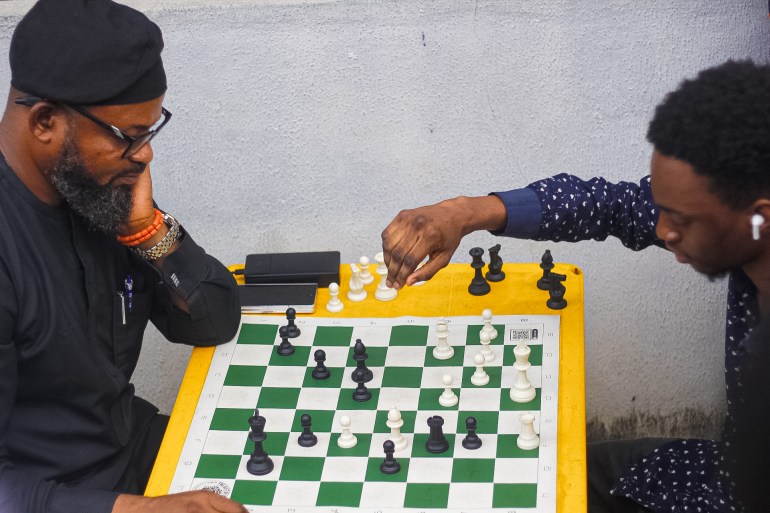
While many still hope for direct and regular government funding, chess nonprofits have publicly had to rely on fundraisers and campaigns like Onakoya’s Guinness World Record attempt to promote the game as well as achieve their humanitarian goals mostly to reduce hunger and the number of out-of-school children.
Beyond funding Nigerian players at local and international tournaments, as well as other grassroots chess development projects, other stakeholders also believe that it is crucial now to introduce chess into the Nigerian educational curriculum.
“If chess is also recognised as an educational tool, and is actually included in the curriculum, it would help our children in schools also improve their academic performance,” Lekan Adeyemi, former NCF president and sitting vice president of FIDE, told Al Jazeera. “The body in charge of curriculum for the government probably doesn’t have the will [to implement it]. Chess is in the curriculum of many countries all over the world. Chess is now used in society, as a tool, to develop so many areas.”
The Nigerian Sports Ministry was contacted by Al Jazeera for a response about its commitment to funding and developing chess and related projects in the country but did not respond.
Meanwhile, on a hot Tuesday afternoon in Azeez’s parents’ compound, he leans over a small table to move a pawn on a child’s chessboard. There’s a curious look in his eyes and it’s hard to tell if it’s a happy or sad one right away.
“When I started Milverton Chess Academy, things were a bit good for me [financially]. Now, my mind is not settled. I have to do a lot of menial jobs to take care of my parents,” he said.
“Chess is what I love to teach. If one has support, one can focus. If there is support, the load will be minimal [and] I will raise world talents.”
